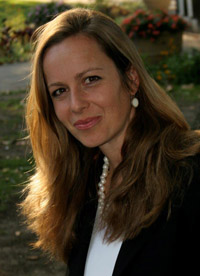 One of the most common reasons that people contact Hoffman is because they feel stuck. Often some area of life feels as if it keeps repeating with little excitement or fulfillment. One way to get out of a rut is to look at the story you tell yourself about your life and your role in it. Psychotherapist Heide Baumann, who did the Process in 2007, is an expert in this approach. Having combined 17 years of corporate life with being a mother, a therapist, and being rooted in German culture while living in the UK, she’s intrigued by the way we link different environments. Here she gives you the chance to look at your own life in a way that may help you discover how to be more authentic more of the time and even re-invent yourself.
One of the most common reasons that people contact Hoffman is because they feel stuck. Often some area of life feels as if it keeps repeating with little excitement or fulfillment. One way to get out of a rut is to look at the story you tell yourself about your life and your role in it. Psychotherapist Heide Baumann, who did the Process in 2007, is an expert in this approach. Having combined 17 years of corporate life with being a mother, a therapist, and being rooted in German culture while living in the UK, she’s intrigued by the way we link different environments. Here she gives you the chance to look at your own life in a way that may help you discover how to be more authentic more of the time and even re-invent yourself.
Changing Roles…
We live in times of flux, with transitory identities. We are no longer chefs but ‘currently working as a chef’, not Cornish but ‘living in Cornwall for the past three years’, not conservative, but ‘voted conservative last time around’. We constantly construct and reconstruct ourselves as we play different roles throughout the day – the commuter, the yogi, the Londoner, the conscientious worker, the loving partner, the football fan, the children-from-school-picker-upper. There isn’t such a thing as a singular ‘authentic’ self; like a chameleon we adapt our colour to our environment. Beyond all the optimised self-images created on twitter, facebook, youtube, linkedIn and instagram lurks the question: who is the real me?
In which roles do you feel the most authentic and which contain the greatest challenge or opportunity for growth?:
- Your role at work
- Your role as a parent
- Your role as a daughter or son
- Your role as a lover
- Your role as a breadwinner?
 Cultural Norms
Cultural Norms
To put yourself in a position of feeling more authentic and ‘real’ more of the time, it’s important to notice where your beliefs, habits and values originate. This could be everyday rituals, language, cultural norms and your own family’s origins. In the UK, for example, there’s the proverbial ‘cuppa’ that will sort everything out, or the ‘how are you’ – that certainly mustn’t be answered truthfully. It may indeed be a very sound piece of advice not to get too deep and earnest where this is culturally not acceptable. But it can be important to examine whether complying with such norms leaves you yearning to feel more real and alive.
As far as language is concerned, multilingual people tend to use different languages to express or repress emotion. Interestingly, whilst you can expect a heightened emotionality in the language(s) learnt very young it’s certainly easier to curse in a language that’s not your first!
Points to consider:
- What were the rules in your family when you were growing up?
- Did you grow up in the culture that your parents are from?
- How would you describe the different cultural environments you participate in?
- Did your parents speak different languages?
- Did your grandparents raise you?
- What kind of school did you go to?
Finding Meaning
Gaining awareness of your conditioning and innate preferences can be an important first step to feeling more in touch with your creative spark and your purpose. It can give you a sense of urgency and help you make conscious choices about what’s appropriate and safe to present and share in certain situations, rather than leave you feeling as if you’re hiding behind a mask. An entrepreneur recently told me that his new favourite answer to the obligatory identity question “what do you do?’ has become “I tame dolphins” (with a very straight face).
We all hold any number of possibilities to interpret our life experiences, realities and the roles we play. We are certainly shaped by our experiences but even more so by the meaning we give them. One man’s failure can be another man’s breakthrough. Key turning points and events in our life offer an opportunity for life-affirming or even healing stories. The chairman of a charity recently told me: “the best thing that ever happened to me is that I got myself fired. It felt dreadful at the time and I thought it was the worst thing that could happen to me. But it provided me with money for a year and the kick I needed to set up my own company”.
Unfortunately, many of us suffer from confirmation bias. Once we’ve made up our mind about something – for instance, what the world is like or what our place in the world is – then we tend to notice those things that confirm our view and interpret events in that way. For example, a woman who believes that men are unreliable and has experienced her parent’s relationship as fractious is more likely to engage with a series of partners who can’t commit in a hope of proving herself wrong – but may also be driven by a voice that says:‘told you so, once again it didn’t work out’.
 Re-Inventing Your Story
Re-Inventing Your Story
In summary, the stories we tell ourselves about who we are can have a profound impact on how we think and feel, our sense of identity and how we show ourselves to the world. When our stories break down or no longer serve us well, we can actively reinvent our accounts in ways that permit us to live more fulfilling lives. Reframing a story so that it empowers rather than victimises us does not mean we deny painful experiences or excuse others for ways they have hurt us, but that we proactively examine the stories we tell about our lives and experiences:
- What story am I choosing to make up about who I am?
- How am I interpreting what’s happened?
- Why am I doing what I’m doing
- Does this story serve me?
- How do I depict myself in relation to those I am close to?
- How can I reframe my story in ways that allow me to see the main characters with empathy, as the complex people they are?
- How might I reinvent the story of my life in ways that give me new meaning and purpose?
Heide is based in Little Venice, West London and offers phone, Skype and face to face sessions. For more information visit www.counselling-directory.org.uk/counsellors/heide-baumann





 Sign up to receive monthly newsletters from Hoffman
Sign up to receive monthly newsletters from Hoffman